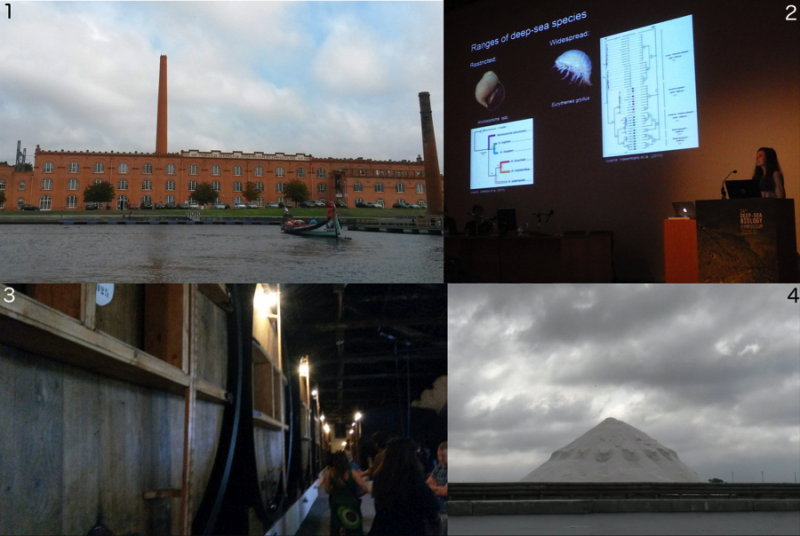Deep-Sea Biology Symposium 2015: Portugual
Magdalena N. Georgieva
University of Leeds & Natural History Museum

Firstly I would like to say a huge thank you to the Challenger Society for their support in enabling me to attend the 14th Deep Sea Biology Symposium (DSBS). This was truly one of the best and most valuable meetings that I have attended during my PhD, and I am very please that I had the opportunity to present my work there.
The symposium took place in a beautifully renovated ceramics factory that is now a conference centre, situated on the edge of one of Aveiro’s canals (these have earned Aveiro its nickname, the Venice of Portugal). The meeting kicked off with, among others, a very warm welcoming from the deputy mayor of Aveiro who informed us that her city is also famous for its salt production, which we received a sample of in our conference bags. After this, a very busy program of talks ensued, numbering over 200 in total and spread over two parallel sessions, in addition to over 230 posters on display in four different rooms. With ~350 delegates this was the largest DSBS to date, and included presentations on a very diverse range of topics from deep-sea mining from a lawyer’s perspective, to the latest findings on biodiversity in the deepest parts of our oceans, the hadal trenches.
My talk took place towards the end of the week, and while I had been very nervous beforehand, I instantly felt more relieved whilst I was giving it. I also had a poster to showcase quite a different aspect of my PhD research, which I was very honoured to win a prize for! Another highlight of the week was the conference dinner, for which we went to Porto where we explored the cellars of Taylor’s, one of the oldest and largest port producers in the world.
Attending this conference was such a unique and amazing opportunity to catch up on all the latest deep-sea research findings, interact with a friendly and inspirational community of scientists, and to help me to expand my ideas as well as place my research within a wider context. Thank you again Challenger Society for enabling me to go!
Photo caption:
1. Cultural and Congress Centre of Aveiro, where the 14th DSBS was held. 2. Presenting my talk. 3. Conference dinner tour of Taylor’s port cellars. 4. Salt mound along one of Aveiro’s canals.
Profile:
I am a third year PhD student at both the University of Leeds and Natural History Museum, investigating the morphology, ultrastructure and palaeontology of polychaete worm tubes from chemosynthetic environments. I am interested in the evolutionary history and taphonomy of polychaetes within these environments, their palaeoecology, as well as the distribution and morphological plasticity of modern tube-building polychaete worms.
Twitter post:
Back to work after a truly amazing and valuable week at #14DSBS, thank you @challengersoc for helping me to go!
Latest News
Royal Society Publishing Photography Competition 2025
Please see a message from the Royal Society below:
We are delighted to announce that the 2025 Competition is now open for entries until 15 August for a chance to win £1000! The competition celebrates the power of photography in conveying the wonder of science happening all around us and photographs can be submitted in the categories of: Astronomy, Behaviour, Earth Science and Climatology, Ecology and Environmental Science, and Microimaging.
The competition is free to enter and open to anyone studying or working in science at graduate level or above. Category winners will receive a one-year membership to the Royal Photographic Society and the overall winner will receive a grand prize of £1,000. Find out more: https://bit.ly/RSPphotocomp
October 2025 MEDIN Workshop: Marine Data Management, Governance and the MEDIN toolset
The Marine Environmental Data and Information Network (MEDIN) are pleased to announce that registration is now open for the next occurrence of our popular free online training workshop: ‘Marine Data Management, Governance and the MEDIN toolset’ on the 13th – 17th October 2025 on OceanTeacher Global Academy.
Marine Data Management, Governance and the MEDIN toolset
The Marine Environmental Data and Information Network (MEDIN) and OceanWise are delighted to invite you to attend our popular free online training workshop: ‘Marine Data Management, Governance and the MEDIN toolset’ on the 19th – 23rd of May 2025.
